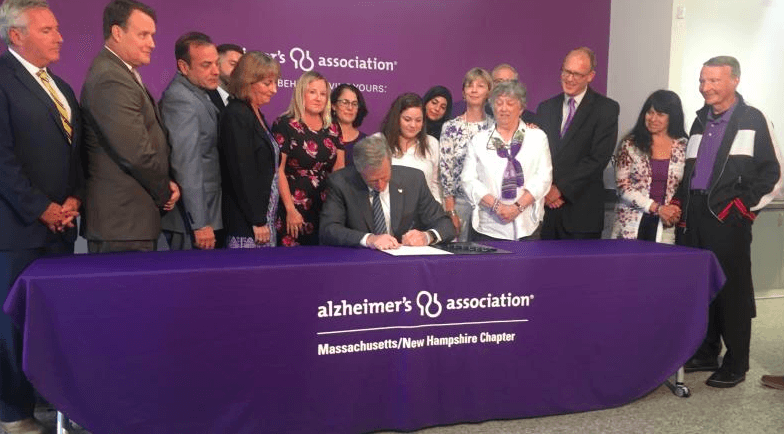Some of the challenges faced by people with Alzheimer’s disease and their families can be found in a doctor’s office or a hospital. Large numbers of people affected are not diagnosed or, in some cases, not told of the diagnosis. Hospitals and their staffs are not always prepared or trained to recognize and help patients with Alzheimer’s. Gerontology Institute Director Len Fishman recently talked with Jim Wessler, chief executive of the Alzheimer’s Association Massachusetts/New Hampshire Chapter, about those challenges and a landmark law passed last year in Massachusetts intended to deal with them. The following is an edited version of their conversation.
 Len Fishman: The Alzheimer’s Association reports less than half of Americans with Alzheimer’s disease have been diagnosed and less than half of them have been told of their diagnoses. That means about one in four Americans with Alzheimer’s know they have it. What are the impediments to diagnosis?
Len Fishman: The Alzheimer’s Association reports less than half of Americans with Alzheimer’s disease have been diagnosed and less than half of them have been told of their diagnoses. That means about one in four Americans with Alzheimer’s know they have it. What are the impediments to diagnosis?
 Jim Wessler: People with diseases don’t want to hear the bad news so there may be some reluctance to bring it up with their doctor. But in survey data, well over 90 percent of both patients and physicians say a cognitive assessment is important. An overwhelming number of people expect their physician will bring it up. Most don’t go to their doctors and say, “I want to get my blood pressure checked and I want the blood test for cholesterol and while you’re at it, let’s look at my sugar count and all that.” You expect the question as part of their assessment of your health. Right or wrong, consumers expect doctors will do it.
Jim Wessler: People with diseases don’t want to hear the bad news so there may be some reluctance to bring it up with their doctor. But in survey data, well over 90 percent of both patients and physicians say a cognitive assessment is important. An overwhelming number of people expect their physician will bring it up. Most don’t go to their doctors and say, “I want to get my blood pressure checked and I want the blood test for cholesterol and while you’re at it, let’s look at my sugar count and all that.” You expect the question as part of their assessment of your health. Right or wrong, consumers expect doctors will do it.
LF: What about medical staff—why aren’t they taking the initiative?
JW: There are multiple things happening on the clinical side. There’s a general confusion around appropriate screening and assessment tools. What are the protocols? How do you decide who should and shouldn’t get screened? What’s the value of it if we don’t have disease-modifying treatments? Then there’s the issue of time in the average doctor-patient visit, particularly if we’re talking about an elderly patient. They have arthritis, chronic heart disease and two or three other things they’re checking up on, and that’s all within a visit of 14 minutes and 22 seconds. They may feel they just run out of time.
LF: When doctors do diagnose patients, why are they often not telling them they have the disease?
JW: I think part of it is that we have no disease-modifying treatments. They may feel the benefits of existing drugs — cholinesterase inhibitors like Reminyl and Aricept – are modest. In some cases they may prescribe them and not tell patients they believe they have Alzheimer’s disease. They might say, “This might help you with your memory a little bit.” I think physicians are no different than other humans. They don’t like to give bad news, particularly when then they don’t believe there’s a clear course of action. We can actually treat high cholesterol and high blood pressure. With Alzheimer’s and other dementias, I think they don’t know what they can do.
LF: Explain why it’s important that patients be diagnosed and that they be told of the diagnosis?
JW: If you’re cognitively impaired and neither you nor your caregivers are aware, then you’re going to be unsuccessful managing it. At some point the person with dementia will be unable to communicate and sometimes actually unable to even understand or fully process questions that might come up around important care decisions. Learning as early as possible enables the person with dementia and the family to put in place legal and financial planning, prepare a health care proxy and talk about treatment desires as the disease progresses. Start putting those support systems in place in advance. Too often, we have found families contacting us in crisis.
LF: How many people in Massachusetts have Alzheimer’s disease?
JW: The prevalence estimate is 130,000.
LF: Is the figure different if you include other dementias?
JW: Yes and we don’t have that. Alzheimer’s is 60-70 percent of the dementias.
LF: How are minority communities disproportionately affected?
JW: African-Americans have a prevalence rate about two times higher than Caucasians. For Latinx/Hispanics, it’s about 1.5 times.
LF: Let’s talk about the Massachusetts Alzheimer’s and Dementia Act, which became law in 2018. It requires training for physicians, physician assistants, RNs and LPNs in the diagnosis, treatment, and care of patients with cognitive impairments including but not limited to Alzheimer’s disease and dementia. What are the key things that you’re hoping health care professionals take away from the training they get?
JW: We hope and expect health care professionals will become attuned to fact that this is an important disease, or set of diseases, that needs to be part of their routine healthcare practice, particularly when it comes to older adults. We hope they will understand the screening and diagnostic process, particularly in primary care. There are not enough neurologists or neuropsychologists to diagnose everybody so we have to get this skill set into primary care. Also, we expect them to know the available treatments.
LF: The law also requires hospitals to implement an operational plan for the recognition and management of patients with dementia or delirium. Right now, what are the most significant gaps in hospital care?
JW: We often talk about hospital care as the last frontier of the health system that is really not attuned and set up to deal with people with Alzheimer’s or cognitive impairment. Usually people are not hospitalized for their dementia, but for something like a urinary tract infection or a broken hip. Then when they come home their cognitive status has declined dramatically. This has to do with multiple things including pharmacological restraints because Mr. Jones was trying to get out of his bed at two in the morning and pulling the IVs out of his arm. About 75 percent of people admitted to hospitals go through the emergency department so that’s a really a central place where screening should take place. Those departments are very busy, loud, noisy places. How do we create an environment there where someone with Alzheimer’s or dementia can reside?
LF: What about the care for inpatients?
JW: On the actual floors, it’s important to give the direct care staff tools and training to effectively take care of their patients with cognitive impairment. Cognitive health needs to be part of the equation all the way to discharge planning, whether it’s to the long term care facility or back to the community. Planning for that patient should not just focus on the repaired hip. If cognitive health is not addressed in discharge plans, you could very well have that patient back in the hospital because they fell again due to confusion, and so many other things that accompany their impairment.
LF: In all, how many health care professionals will be affected by the law’s training requirements?
JW: About 186,000 professionals.
LF: And health care professionals have four years to get the training?
JW: Yes, the four-year clock started ticking last November. Going forward, any newly licensed professional in those fields would also have to get this training.
LF: Training 186,000 people is pretty staggering. How will that work?
JW: This is CME [Continuing Medical Education] for doctors and CEU [Continuing Education Unit] training for nurses. They normally get training as a natural part of their licensure and there are many programs online via hospitals or medical schools. The Alzheimer’s Association has a CME program and we’re putting that online. The Massachusetts Medical Society is developing its own CME program and half of the physicians in the state are members. We plan to sit down with the Mass. Nurses Association. They don’t represent all nurses in the state but they’re interested in collaborating on the CEU program. The Alzheimer’s Association wants to have a state of the art program.
LF: What about family caregiver issues?
JW: This is about the importance of family getting care and support. Doctors need to to connect them to the Alzheimer’s Association or someone else. The family caregiving unit of a person with Alzheimer’s needs support.
LF: You mentioned there were about 130,000 people in Massachusetts with Alzheimer’s disease. Do you have an idea of what that translates into in terms of caregivers?
JW: It’s about a three-to-one ratio, maybe a little less. So, there about 350,000, and we’re not talking long-distance caregivers. Whether it’s 24/7 caregivers or if it’s an adult son or daughter routinely in the home providing help and assistance with support for their parent or niece or whatever.
LF: How will we know if the training requirements are working? Is there a way of monitoring whether we’re seeing an increase, for example, in diagnosis? An increase in the number or the proportion of people who are being told after diagnosis? An increase in people who are being referred for treatment and care?
JW: In terms of tracking whether the diagnoses are increasing, we don’t have a plan in place right now for this. We’re pretty confident it’s going to have an impact, but how do you monitor that? It’s hard to say.


March 9, 2021 at 11:05 am
exam bank
I love the humor your post has offered. I enjoyed this site a lot. Keep posting article like this. It is fun. Nice photography too!
March 19, 2021 at 2:18 pm
in stream advertisement
Incredible posting this is from you. I am really and truly thrilled to read this marvelous post. You’ve really impressed me today. I hope you’ll continue to do so!
Y